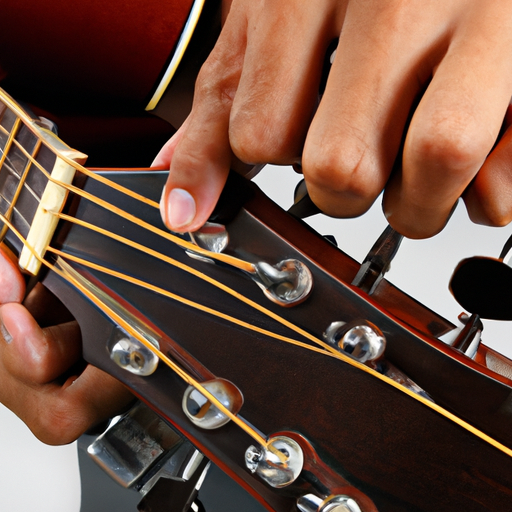
Guitar tuning is an essential aspect of playing the instrument. A well-tuned guitar produces better sound quality and enhances the overall playing experience. In this article, we will discuss the importance of tuning your guitar and the different methods you can use to achieve optimal sound.

Guitar tuning is the process of adjusting the pitch of the strings to the desired frequency. Proper guitar tuning is crucial because it affects the sound quality, intonation, and playability of the instrument. A poorly tuned guitar can sound off-key and be difficult to play. Therefore, regular tuning is necessary to maintain the guitar's performance and sound quality.

The standard tuning of a guitar is E-A-D-G-B-E, from the thickest string to the thinnest. This tuning is the most common and widely used tuning for the guitar. It is essential to understand the standard tuning to learn how to tune the instrument properly.
Several types of tuners are available for guitar tuning, including clip-on tuners, pedal tuners, and smartphone apps. Clip-on tuners are the most popular and easiest to use. They clip onto the headstock of the guitar and detect the frequency of the strings through vibrations. Pedal tuners are more advanced and used by professional guitarists. They require an external power source and are usually part of a pedalboard setup. Smartphones apps are convenient and portable, but they may not be as accurate as other types of tuners.
Tuning by ear is a skill that every guitarist should learn. It involves matching the pitch of the strings to the desired frequency using your ears. The best way to practice tuning by ear is to use an external reference, such as a piano, and match the pitch of the guitar strings to the corresponding keys on the keyboard.
A tuning fork is a small, metal instrument that produces a specific pitch when struck. It can be used to tune a guitar by matching the frequency of the fork to the corresponding string on the guitar. Tuning forks are accurate and reliable, but they require a trained ear to use effectively.
Electronic tuners are the easiest and most accurate way to tune a guitar. They display the frequency of the strings and indicate whether they are sharp or flat. To use an electronic tuner, clip it onto the headstock of the guitar and pluck each string. The tuner will display the frequency and indicate whether the string is in tune or not.
Harmonics are a useful technique for tuning a guitar. They produce a clear and pure tone that can be used to tune the strings accurately. To tune using harmonics, place your finger lightly on the string above the 12th fret and pluck the string. The resulting sound is an octave higher than the open string. Adjust the tuning of the string until the octave sound matches the pitch of the corresponding harmonic on the 12th fret.
Regular tuning is crucial for maintaining the optimal sound quality of the guitar. A guitar that is out of tune can produce a dull, flat, or off-key sound. Regular tuning ensures that the guitar produces the correct pitch and intonation and makes it easier to play chords and melodies.
Intonation refers to the accuracy of the guitar's pitch across the fretboard. Poor intonation can cause chords to sound off-key and make it difficult to play in tune. To adjust intonation, use a tuner to check the pitch of the strings at the 12th fret. If the pitch is sharp or flat, adjust the saddle to correct the intonation.
Common tuning issues include loose or old strings, poor string winding, and faulty tuners. To fix loose or old strings, replace them with new ones. Poor string winding can cause the strings to slip out of tune, so make sure to wind them tightly and evenly. Faulty tuners can be repaired or replaced by a professional guitar technician.
Conclusion
Tuning your guitar is essential for achieving optimal sound quality and enhancing the playing experience. By using the different methods discussed in this article, you can ensure that your guitar is in tune and produces the correct pitch and intonation. Whether you prefer to tune by ear or use an electronic tuner, regular tuning is necessary to maintain the performance of your instrument.
Click here to read more about guitar tuning.